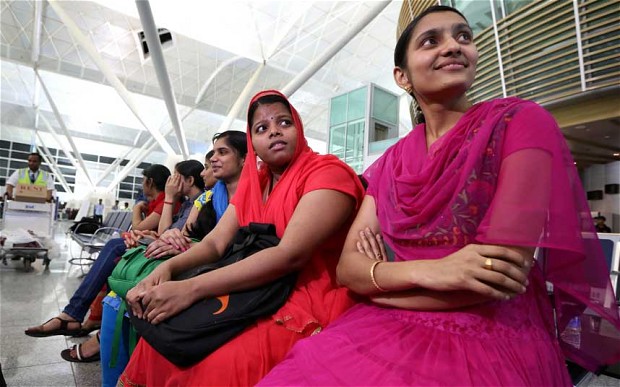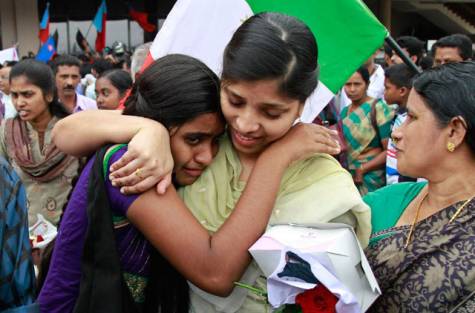 Process of Return Speeded up Since Return of Nurses to Kerala
Process of Return Speeded up Since Return of Nurses to Kerala
By TN Ashok / Diplomatic Editor
New Delhi, July 06: Over 2200 Indian nationals stranded in strife torn Iraq have evinced a desire to return to India and the process of getting them back home has been put on fast track now with the success achieved in repatriating the 46 nurses of Kerala home after freeing them from captivity.
Of these, 600 have been provided tickets through the facilitation of our Mission in Iraq to depart, and 600 have been paid by their respective companies. In addition, approximately 1600 are being provided tickets by the Government of India for their return from Iraq to India, MEA’s official spokesperson Syed Akbaruddin told newsmen today at a special briefing.
Since yesterday the momentum and the pace at which Indian nationals are returning from Iraq has speeded up. An Air India flight brought approximately 170 and also an Iraqi Airways special flight brought approximately 200 people from Najaf to Delhi.
 In addition, tonight an Iraqi Airways flight, this is a normal flight from Baghdad to New Delhi, is also being diverted to Najaf and it will carry back 117 Indian nationals who will arrive here late tonight. Also, within the next 36 to 48 hours, two other special flights will be flying into New Delhi. One of these is from Najaf tomorrow morning. The flight starts at 11:30 am there and it is expected around 6:30pm in New Delhi. This will carry approximately 200 Indian nationals. Another flight will take off from Basra. This will be the first special flight from Basra. That flight will carry 286 Indian nationals from Basra to Delhi, the spokesperson said.
In addition, tonight an Iraqi Airways flight, this is a normal flight from Baghdad to New Delhi, is also being diverted to Najaf and it will carry back 117 Indian nationals who will arrive here late tonight. Also, within the next 36 to 48 hours, two other special flights will be flying into New Delhi. One of these is from Najaf tomorrow morning. The flight starts at 11:30 am there and it is expected around 6:30pm in New Delhi. This will carry approximately 200 Indian nationals. Another flight will take off from Basra. This will be the first special flight from Basra. That flight will carry 286 Indian nationals from Basra to Delhi, the spokesperson said.
‘ We are also processing documents for another 200 plus people. It is our hope that in the next 48 hours all 1600 who had wanted to return to India on Government of India tickets will be back in India. The 600 who are being paid for by their respective companies, several of them have already come back. Others are on commercial flights from their respective areas in Iraq to India. These people are from Hyderabad, Bengaluru, Kolkata, and Mumbai. These are the flights through which we are bringing in people on commercial flights.
Currently from Baghdad there are ten commercial flights every day to different points in the Gulf. So, we are utilising all that is available in terms of commercial seats. Where they are not available, we are bringing them through special flights using Iraqi Airways, he said.
Approximately 486 telephone calls were received by our control rooms here as well as in Baghdad. Based on those calls we are responding to each of them, and we hope to clarify to them that the people they want have either come back or do not want to come back, he said .
 These are both options. Ultimately it is a judgment call of an individual and it is for that individual to take that call, although the Government of India stands ready to assist them in every way possible manner, he said..
These are both options. Ultimately it is a judgment call of an individual and it is for that individual to take that call, although the Government of India stands ready to assist them in every way possible manner, he said..
The control room used to get about 60 to 80 calls. Today we are down to four to six. That indicates to us that the level of anxiety, the level of concern has reduced considerably. That is partly because we have responded, partly because those who have wanted to come out are either coming out or are in the process of coming out, and the others perhaps have been able to communicate to their friends and relatives that they seem to feel that the situation does not warrant their coming back. That is about the areas in non-conflict zones.
“Our intention is, the spokesman said, as part of a calibration of our approach to the security situation and assistance to Indians in Iraq, is to divert the resources that are freed up from this quick facilitation process into what is an extremely difficult situation in the conflict zone.”
“We are working through, as I have said previously, the front door, the backdoor as well as the trapdoor. But I also want to tell you I see a new genre of journalism coming out these days, I do not know what to term it because sometimes I see new characters who never were in the picture sprouting out and claiming all sorts of views on that. My request to you is we have been informing you of the developments every day; please be patient and work with us; we are here to provide any response that you want. “ he said.
Giving details about the evacuation process, he said, it is the non-conflict zone which is largely in the southern part of Iraq. In that part of Iraq, we have placed mobile teams, now of six persons each. These mobile teams have gone to the areas of work in Najaf, Karbala and Basra. They have collected all details of people who would like to leave and it is our advice to them that they should leave.
It is also our advice to them that in any case if any of them have some problems in terms of paying back for their tickets, Government of India stands ready to pay for those tickets, he said.
Question and Answers at the briefing
Question: How many mobile teams are there in Iraq in total?
Official Spokesperson: We have mobile teams in four locations: Karbala, Najaf, and Basra; in addition in Baghdad although we have an Embassy there is a mobile team. We have six members each in that mobile team.
In Karbala, perhaps you are aware, there was a curfew and so there were difficulties in getting exit visas for those who would like to leave from there. But since then that curfew has been lifted yesterday and we hope that some of those people flying out from Najaf will be those who are from Karbala also. They will be bussed from Karbala to Najaf and then fly out from Najaf.
Question: Sir, as you have said, you are also looking into the contractual engagement of the people who are coming from Iraq. Does it include whether they are being paid by their employers or not?
Official Spokesperson: The issue of labour relations is much more vast than this. You are aware that in that region labour relations are an issue. At this stage we are not there to resolve all labour relations or to restructure the relationship between the employer and the employee in Iraq. What we are doing is that in case there are difficulties for somebody to be released, we will try and work with the employer to ensure that the person who does not want to work there would be released. That of course would entail still going by the contract. And if that contract has some liability, the employer will perhaps invoke it.
It is for the employee to decide whether they would like to return on the basis of existing contracts. Of course we will pay for the cost of return. However, there are other obligations in a contract, and in a contractual relationship it will be up to the employer and employee to work this out. We can only facilitate. And that is why we have been calling this entire process the facilitation process unlike the language that some of you are using.